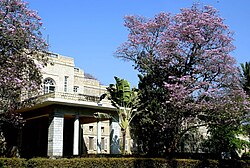Mental Health Outreach
NIMHANS experts criticized a report on mental health in India published by the World Health Organization. Professor of Psychiatry, Dr. S K Chaturvedi, said that the figures by the WHO were highly inflated. Where, in the report, it alleges that 36% of Indians suffer from depression, the highest among all the countries, the NIMHANS faculty state that the incidence of depression is much lower due to a stronger social support system and family structure. [30] However, the lifetime prevalence of depression in India measured by the study was only 9%, and the figure of 36% was a different metric that was mistakenly reported. [31] In May 2015, the faculty association of the institute lodged criticism against the 'Juvenile Justice Bill' which was tabled in parliament. [32] Preeti Jacob, from the Department of Child and Adolescent Psychiatry, was quoted as saying "Juveniles are less culpable and are much more amenable to rehabilitative efforts and thus should not be transferred to the adult criminal justice system. The assessments that are being proposed in the bill in order to ascertain the mental capacity to commit an offence are arbitrary and unscientific." [33] [34]
In December 2014, it was reported that a soldier from the Indian Navy was being held in NIMHANS for a month to evaluate whether he was suffering from mental illness, after acting as a whistleblower. After the month-long evaluation, it was concluded that the Navy person was not suffering from any mental illness. [35] [36] In July 2013, TOI reported that NIMHANS was collaborating with the Central Bureau of Investigation to train its staff with interrogation techniques. [37] In 2012, the central government approached NIMHANS to suppress anti-nuclear protests in regard to building the Kudankulam Nuclear Power Plant. The government asked NIMHANS to dispatch psychiatrists to Kudankulam to counsel protesters. To fulfil the plan, NIMHANS developed a team of six members, all of them from the Department of Social Psychiatry. The psychiatrists were sent to get a "peek into the protesters' minds" and help them learn the importance of the plant. [38] [39]
In 2008, a reality show contestant, Shinjini Sen, after getting reprimanded by the TV show judges, temporarily lost her voice, and physical mobility. It was alleged by the media that the television show judges' behaviour caused such disability. To resolve her case, she was flown from Kolkata to Bangalore's NIMHANS to be treated for a neurobiological condition. [40] [41] [42] Professor B N Gangadhar, the then medical superintendent, told the press, "We can say at this juncture that she could be suffering from depression. Depression does not lead to permanent loss of speech or physical disability. We are diagnosing why that has happened. There could be complex neurological factors leading to such conditions." [41]











